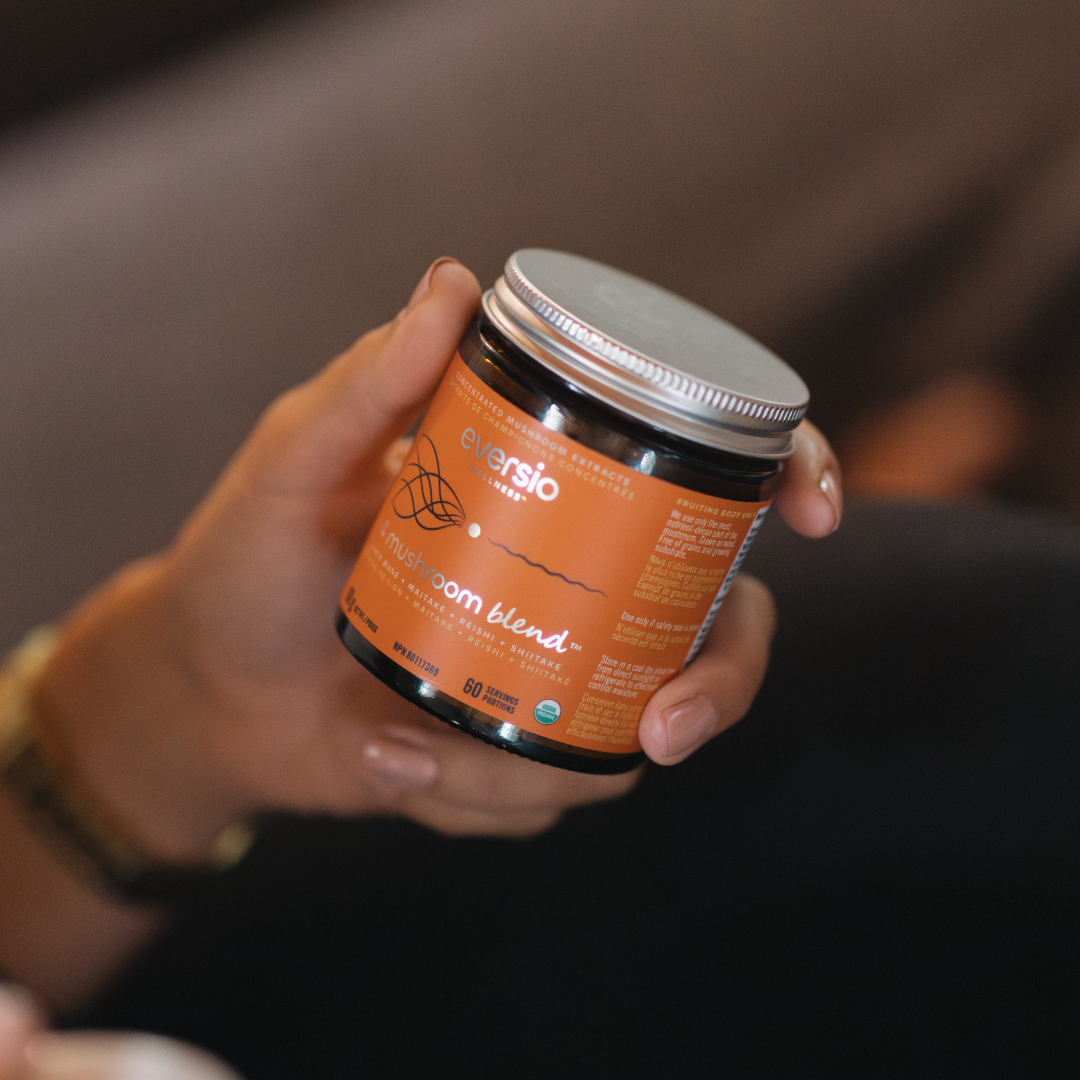July 14, 2025 | by EVERSIO WELLNESS
Mushrooms have been an integral part of various cultures worldwide for centuries [1]. The Greeks believed that mushrooms gave their warriors strength, the ancient Romans thought they were the “Food of the Gods,” and in traditional Chinese culture, mushrooms have long been regarded as an essential health food, deemed the “elixir of life” [1].
Along with being an essential source of food, the benefits of mushrooms are now being recognized for their effects in supporting or treating many different medical conditions [1]. Some mushrooms are even praised for their ability to prevent disease and improve overall health and well-being, regardless of presenting ailments [1]. There are more than 100 functions produced by these powerful fungi, but let’s take a look at a handful of actions you may not have been aware of!
Functional Mushrooms are High in Nutrients
Not only do mushrooms have high functional value, but they are also very high in nutrients [1]. They are quite rich in protein and contain all the essential amino acids, making them an excellent protein source for vegans or vegetarians [1]. In addition to their many bioactive compounds, the nutritional value of mushrooms is supplemented by a bounty of vitamins and minerals, including selenium, potassium, riboflavin, niacin, folates, and traces of vitamin C, B1, B12, D, and E [1].
Mushrooms are the only non-animal food source that contains vitamin D, making them a good option for vegans and vegetarians [1]. While these nutrition facts about mushrooms may have been unknown knowledge in our society, different cultures around the world have been praising mushrooms for their high nutritional content and powerful health benefits for thousands of years.
Great Source of Antioxidants in Functional Mushrooms
Oxidative stress is caused by an imbalance between the level of free radicals and antioxidants in the body [2]. When free radicals overpower our antioxidant systems, it may result in cellular damage and progress to a disease state, leading to a range of medical disorders in humans. Oxidative stress may also lead to activation of inflammatory mediators or further exacerbate the inflammatory processes of existing medical conditions.
The antioxidant potential of mushrooms has been extensively researched, and it is suggested that mushrooms can be used to enhance our antioxidant defense systems, thereby reducing or preventing the development of oxidative stress [2]. While many functional mushrooms deserve an honorable mention, one of the most powerful is Chaga.
Inonotus obliquus, often referred to as Chaga, has one of the highest ORAC (Oxygen Radical Absorbance Capacity) values on the planet! ORAC informs us about a substance's ability to neutralize free radicals, preventing them from overpowering our antioxidant capabilities and causing oxidative stress. A common reason for the use of antioxidants is in the protection and health of our skin. When free radicals accumulate in our bodies, one of how we suffer is through the skin, especially regarding premature aging.
One study demonstrated that Chaga exhibited protective effects against oxidative stress-induced cell death and premature senescence in human fibroblasts [3]. Both of these factors are key biological processes underlying aging because their result is a depletion of many types of cells currently cycling within the body [3]. Additionally, Chaga was able to suppress UV-induced morphologic skin changes, including skin thickening and wrinkle formation [3]. This is just a small insight into the antioxidant functions of just one functional mushroom.
May Have Powerful Cancer-Slowing Properties in Functional Mushrooms
The anti-cancer potential in functional mushrooms has been researched both individually and as an adjunct to conventional therapies [4]. Commonly, functional mushrooms are used to complement chemotherapy or radiation as they counter common side effects such as nausea, anemia, bone marrow suppression, or even lowered resistance [4]. However, bioactive compounds in mushrooms have been shown to exhibit anti-tumor and immunomodulating properties, which may be beneficial in slowing or preventing cancer development [4].
Polysaccharides are the best-known mushroom-derived substances with anti-cancer activities, especially β-glucans, which have a broad spectrum of biological activity [4]. b-glucans are considered biological response modifiers because they have the ability to alter immune responses in the body. One study stated that β-glucans can inhibit tumor growth in the promotion stage through their activation of macrophages and NK cell cytotoxicity, while also reducing tumor proliferation and metastasis through their anti-angiogenetic properties [5].
Terpenoids are another bioactive compound found in mushrooms with prominent anti-cancer activity. One of the terpenes found in Chaga, known as betulinic acid, has exhibited prominent anti-cancer activity by activating the mitochondrial pathway of apoptosis (cell death) in cancer cells [6,7]. As you can see, there are many types of mushrooms with potential cancer-preventing properties.

Beta-Glucans in Functional Mushrooms Can Help Regulate Blood Sugar
As mentioned, β-glucans are found in high levels in functional mushrooms and have a broad spectrum of functional and health-promoting functions [4]. One of these functions lies in its ability to regulate blood sugar. In animal experiments and clinical trials, β-glucans have been found to reduce blood glucose concentrations after oral administration [8]. One method by which β-glucans may have this effect is by delaying stomach emptying, allowing dietary glucose to be absorbed more gradually and preventing large glucose and insulin spikes after meals [8]. Additionally, because it prevents these spikes, it also prevents the feeling of hunger caused by a rapid decrease in blood glucose, thereby decreasing appetite and reducing unnecessary food intake [8].
Another study investigated other possible mechanisms of b-glucans’ anti-diabetic functions and found that they may be able to restore decreased PI3K/Akt, the activity of which has been shown to play a role in the pathogenesis of diabetes [8]. This opens the door to further advancements in the treatment and regulation of high blood sugar through functional medicine.
Functional Mushrooms May Enhance Kidney and Liver Function
The mushroom most studied for its hepatoprotective effects is Ganoderma lucidum, commonly known as Reishi. While it has exhibited powerful antioxidant and radical scavenging activity important to liver health, it has also been found to modulate the phase 1 and 2 hepatic enzymes [9]. High levels of the enzyme ALT in the body are associated with liver damage, and Reishi has been found to inhibit the increase of this enzyme alongside liver triglycerides [9]. Additionally, the mushroom extract prevented the decrease of important liver antioxidants (SOD and GSH), while also inhibiting β-glucuronidase activity, another indicator of liver damage [9].
Mushrooms have also illustrated protective effects on the kidneys, mainly due to their powerful antioxidant capabilities. For example, when used in the treatment of Diabetes, Cordyceps was found to lessen the damage found on the liver, kidneys, and pancreas from prolonged insulin resistance [10]. It was also found to have inhibitory effects on several markers of kidney function, further illustrating its ability to protect against kidney damage [11].

May Protect Against Decreased Mental Function
As we age, our brain’s ability to form or preserve neuronal connections naturally declines and we progressively experience worsening mental functioning. While many mushrooms can help to improve focus and cognition, Lion’s Mane has long established itself as one of the best mushrooms and the strongest mushroom species for the job. It contains several active compounds, but two of those, hericenones and erinacines, have been found to stimulate the growth of brain cells [12]. A constituent, isohericerinol A, extracted from the fruiting bodies of Lion’s Mane, was found in a recent study to strongly increase nerve growth factor (NGF) production, which subsequently improved the outgrowth of neuronal projections and connections [13].
Lion’s Mane has also exhibited neuroprotective actions through its ability to prevent neuronal damage caused by beta-amyloid plaques; accumulations that build up in the brain in Alzheimer’s disease [14,15,16]. The beta-amyloid proteins are naturally occurring, but when they build up and form plaques, this results in disruption of proper cell functioning in the brain. For those with a family history of dementia who are interested in prevention, Lion’s Mane may be an appropriate addition to your efforts.

Where to Buy Quality Functional Mushrooms?
Although the market for functional mushrooms is wide, it is important to be mindful of what is inside of the products you are buying. If a mushroom supplement contains grain products, this should be listed in their “other ingredients.” Suppose you find the words “full spectrum”, “mycelial biomass”, or “extracellular compounds” on the label. In that case, this means the product is made from the grain substrate the mushrooms are grown on, and potentially the primordia and fruiting body, all combined and often not in extract form.
Full spectrum is often advertised as a beneficial aspect of the product by some companies, but it means you’d need to consume much more of it to achieve the same benefits as you would from a product containing 100% fruiting body.
Eversio Wellness offers 100% fruiting body-only mushroom extracts, consistently practicing transparency with their consumers by sharing the COAs (Certificates of Analysis) for each product. The COAs reassure consumers that the percentage of compounds claimed to be in the products is scientifically confirmed through laboratory testing. Not only does the COA confirm the presence of the beneficial constituents, but it also tests the heavy metal and microbial contents, so you can be sure that your mushroom product is safe.




















Leave a comment
All comments are moderated before being published.
This site is protected by hCaptcha and the hCaptcha Privacy Policy and Terms of Service apply.